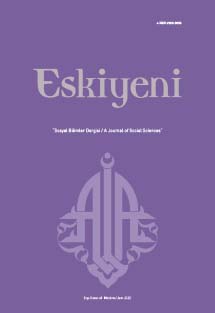İbn Âbidîn’in Vehhâbîler Hakkındaki Görüşlerinin Hind Alt Kıtası Hanefilerine Etkisi
The Effect of Ibn Ābidīn’s Views on the Wahhābis On the Hanafī Schools of the Indian Subcontinent
Author(s): Adem ArıkanSubject(s): History of Islam, Sociology of Religion
Published by: Anadolu İlahiyat Akademisi
Keywords: History of Islamic Sects; Ibn Ābidīn; Wahhābis; Barelvis; Deobandis;
Summary/Abstract: Hanafī scholar Muhammad Amīn Ibn Ābidīn (1198-1252/1784-1836) witnessed important developments for the history of the Wahhābis during his lifetime. Wahhābis captured the Hijaz. However, the governor of Egypt Kavalalı Muhammad ‘Ali Pasha and his sons Tosun Pasha and Ibrahim Pasha took back the Hijaz and abolished the first Saudi government established by the Wahhābis. Ibn Ābidīn in his work Radd al-Muhtār considers the Wahhābis as the rebels who rebelled against the state. He sees them as Kharijites who rebelled against Caliph Ali, andhe refers to them as “Kharijites in our time”. According to Ibn Ābidīn, Wahhābis accept the Hanbali school. However, they believe that only they are Muslims, and consider their opponents as polytheists. They consider it permissible to kill members of Ahl al-Sunnah. Hanafī sects that emerged recently in the Indian subcontinent criticized the Wahhābis Ahmad Rizā Han Barelvi/Barelwi (1272-1340/1856-1921), the founder of the Barelvi community, is a Hanafī Māturīdī and Sufi known for his anti-Wahhābi stance. Barelvi accuses the Deobandis, who are Hanafī Māturīdī and Sufis like himself, of being Wahhābis. Deobandi scholar Khalīl Ahmad Sahāranpūrī (1269-1346/1852-1927) evaluates the Wahhabis as Kharijites by quoting the statements of Ibn Ābidīn and rejects the Wahhābi attribution made to them. These statements of Sahāranpūrī were also confirmed by the prominent Deobandi scholars of the period. Being anti-Wahhabi does not mean being pro-Ottoman. The caliphate view of the Barelvis, who did not see the Ottoman caliphate as legitimate because they were not from the Quraysh generation, is in line with the caliphate claim of Sharif Hussein, who would agree with the British and rebel against the Ottomans with the claim of caliphate. Sharifs also fought against the Wahhābis. Deobandis rejected Sharif Hussein’s claim to caliphate and continued to support the Ottoman caliphate. In this study, the views of these two Hanafī schools on Wahhābism are discussed by establishing their relationship with the historical developments in the region.
Journal: Eskiyeni
- Issue Year: 2023
- Issue No: 49
- Page Range: 563-590
- Page Count: 28
- Language: Turkish

